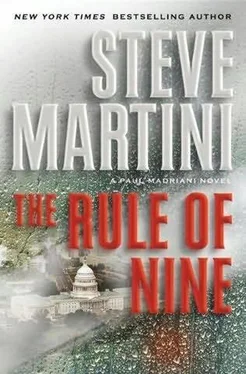He checked the windows and the doors; the office was wired, and probably monitored by a security service from a central location. Through one of the windows he could see motion detectors, at least two of them on the ceiling in the reception area. He could toss a potted plant through the window. Security would call the police and then whatever number they were given for the client. If it was Madriani or his partner, they would tell security to have the window boarded up and to reset the alarm. They might even hire security to be posted inside. If security called one of the employees, it wasn’t likely that they would show up at the office, not if Madriani had sent them home and told them why. Even if Liquida could get into the office, he weighed the prospects of finding anything useful there and decided it would be better to case Madriani’s house before trying the office. What he wanted was some clue as to where they were hiding. There had to be something.
Liquida suspected that the two lawyers didn’t get rid of the tracking devices immediately. The online data from the satellite company showed continuous travel of the two cars from the point of departure at the house for Madriani and the location in San Diego for the partner. He couldn’t be certain regarding the partner’s vehicle, but Liquida had seen Madriani and the investigator drive away from the house. The tracking data showed him going north on I-5. The first time the vehicle stopped was a few miles south of Santa Ana. According to the tracking data, the vehicle was still traveling north on I-5, but was now somewhere near Medford, in Oregon. It was probably on the back of a truck. Liquida was guessing that they dumped the tracker at their first stop. And they could have been going north, just to throw him off. But there was a chance that if Madriani was going north, his destination was in that direction.
The other tracker was more problematic. Assuming it was still on the partner’s vehicle when it left San Diego, the partner and Madriani’s daughter were headed east. They took I-8 and didn’t make any stops for more than a hundred miles, until they reached El Centro. That would be a long way to go just to throw somebody off your track.
By the time Liquida reached Madriani’s house, it was almost ten o’clock. He parked his car down the block in front of the same old For Sale sign. The place was beginning to feel like home. He grabbed a small black day pack from the backseat, stepped out, and closed the car door. He didn’t lock it in case he had to beat a hasty retreat. Then he casually strolled across the street and down the sidewalk. The neighborhood was dark except for interior house lights and the blue haze from a couple of television sets. Liquida reached into the bag and pulled out a black ski hood and a pair of gloves. By the time he arrived in front of the house, a half block down, he had the gloves on his hands and the hood rolled up on top of his head like a hat. He looked for security cameras, the big ones that cities sometimes mount on lampposts. He didn’t see any. He walked slowly up the driveway toward the backyard, no furtive moves, very calm and deliberate, as if he owned the place. At the same time he rolled the hood down over his face and head. He checked the neighbor’s windows to make sure nobody was looking out, and then stopped for a moment to glance toward the front porch. He was looking for any small security cameras that might be tucked up under the porch roof, not that he could see them even if they were there. Some of the new cameras were not much bigger than an eraser on the end of a pencil. He wanted to flash his little pen-size Maglite up under the eaves for a better look, but the bright beam might draw attention.
He headed toward the back of the house and, like a cat, settled on the top step at the back door. Four days earlier Liquida had seen Madriani and the man called Diggs, the big, bald, black investigator, go out this way. The bald head and the man’s mountainous size were engraved on Liquida’s memory from their first encounter down in Costa Rica almost a year ago. They had never come face-to-face, but Liquida had gotten a good look at him from inside as Diggs tried to pick the lock on the front door. As far as Liquida was concerned, that was close enough. If and when he had to deal with the man, he would want to make sure that he had a considerable edge, preferably long and sharp, and a good deal of surprise.
Liquida had a set of lock picks in his bag. The problem was, if he opened the door, it would trip the alarm. He could see the small control panel on the wall in the kitchen with its flashing red light. The alarm was set. Cutting power to the house wouldn’t disable it, at least not immediately. Most of the systems had battery backups and would shoot off a signal over a dedicated phone line the second he opened the door.
He didn’t see any infrared motion sensors. These were usually housed in tiny plastic units up near the ceiling and sometimes showed a small flashing red light when they were on. This was good. It meant that if he could somehow get inside the house without triggering the alarm, he would be able to move around freely and presumably leave the same way he’d gotten in. Liquida decided to scope out the rest of the house.
It was bungalow style, probably built before the war and remodeled several times since. Older bungalows, especially those in Southern California, often had a soft spot in terms of entry. Unlike the newer ranch homes that were built on concrete slabs, the old bungalows sat on cement piers with short posts holding up the floor joists. There was a dirt crawl space under the house. And because the bungalows were small, with limited storage, in many of the originals, not having a garage, contractors would often excavate a small eight-by-ten-foot hole under the house somewhere, line it with concrete walls, and advertise the house as having a cellar. You couldn’t always tell because many of these small concrete cellars had no exterior exit or entrance. The only way in or out was a trapdoor, usually in a closet floor with a built-in wooden ladder going down to the cellar.
Liquida poked around the outside of the house for several minutes before he found what he was looking for. It was a small lattice panel, two and a half by three feet wide, held in place by two hook-and-eye hasps, the kind you might use to latch a gate. He popped the hooks out of the eyes and lifted the lattice panel away from the siding, then reached into his bag and found the Maglite. He flashed it into the crawl space under the house; peers and posts, and twenty feet away a rough edge of concrete. Shazam! Liquida could see a set of wooden steps disappearing below the top of the concrete wall, spanning the gap between the crawl space and the floor above.
He didn’t have any coveralls. Liquida would have to crawl through the dirt under the house in his street clothes. He shimmied through the opening, crossed the span of dirt on his belly like a snake, and lowered himself over the wall and into the cellar. Holding the Maglite in his teeth, he dusted his clothes off with both hands, then quickly climbed the ladder.
He pushed on the overhead trapdoor. It rattled along the right side but wouldn’t budge on the left. Liquida realized it was hinged on the left and locked on the right. He focused the Maglite into the slender crack along the right edge and saw the reflection of a yellow glint. Liquida smiled. Ten thousand dollars in home security equipment, and a two-dollar sliding brass latch.
Liquida reached into his bag and found the cordless quarter-inch minidrill and fitted it with a long metal cutting bit. He checked with the Maglite to line it up so that the tip of the drill bit was centered in the crack directly under the sliding latch on the lock. Holding the light in his teeth, he pulled the trigger on the drill and pushed the bit through the wood and into the soft brass of the lock. He reversed the drill, pulled the bit out, repositioned it, and drilled again. On the third attempt he severed the slide on the lock, dropped the drill in his bag, and pushed up on the trapdoor. It lifted.
Читать дальше












